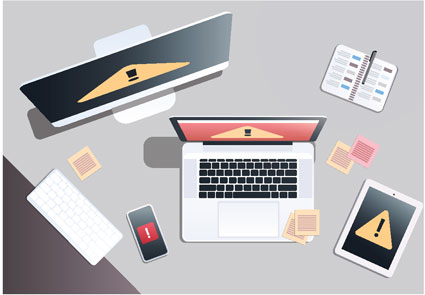
As you are all aware, the recent Covid-19 outbreak has caused major upheavals in our lives. Many outside activities have closed. No malls for that therapeutic shopping, no restaurants, no movies and OMG no nail salons! We are all now living the lives of our great grandparents, when the sidewalks were rolled up at dark. so, we are all now hunkered down in our homes keeping ourselves entertained with TV and the internet. Be aware that the baddies out there know this and are ready to take advantage……
Don’t become an internet target
Here’s a common scenario: Marge is tootling along on her laptop bopping from one link to another when Ta-DA, a red screen pops up with or without a siren blaring and delivers a message, “your computer is infected call this number immediately!!” So, Marge calls the number… and that’s not good.
Your computer will never, ever, warn you in this manner. I repeat, never. If your antivirus program (yes, you do need one!) finds an infection, a notice may appear at the bottom of the screen with a warning. It will not ask you to call - all instances like that are attempts to scare you into a scam situation.
So, what should you do? Shut down your computer and then restart. If nothing bad happens when you go back onto the internet, you are good. If it happens again, avoid the website or use a different browser. Whatever you do, do not call the number!.
Be aware that the bad guys in the world, who make a very good living tricking people out of their money, know that there are a lot of people staying home and using the internet to ward off boredom. They have seeded many websites with these pop-up screens -more than the usual amount. Remember, they are like billboards on a highway… just pass them by.
Email is no safer
Here’s another situation: Bob is reading his email. He sees a message from his bank, credit card, investment firm asking him to send his password. That should be an automatic Red Alert! This is a Phishing attack. Someone - not your bank, credit card or investment firm - has sent this. Never give your password to anyone. Many people have been conned into giving out their bank password and seeing their accounts vanish.
The IRS is not emailing you
While we are on the subject of email, be aware that the IRS (or any government agency for that matter) will never emaill you to tell you that there is an issue with your accounts or that your social security number is compromised. That guy in Nigeria with the gold? Not going to happen. Publishers Clearing House asking for money to release that check…umm no. All these are scams. If you get one, mark it as junk or spam. Do not call or reply. If you don’t know why you are getting an email or who it is from, most of the time your best bet is to not open it.
Remember the old saying that if it seems too good to be true, it probably is. Don’t be fooled.
Finally, there are the phone scams, only now they’ve moved to your cell phone as well. Here’s an example: Phyllis goes nowhere without her cell phone. She is sending and receiving texts from all her social media accounts. She receives a text- supposibly from a neighbor -claiming that Covid-19 tests are available for Medicare recipients, just call this 1-800 number. She calls and gives her health insurance information and her Social Security number. Oops!! Again, never give personal information out to strangers. If a phone call starts with “Do not hang up….” HANG UP! Press no other numbers. These are robocalls and doing anything else will insure you will be getting more. Why? Because now they know it is a real number for a real person.
It’s a scary world out there people, but if we keep our wits about us and use our commonsense we will make it through.
Be safe.